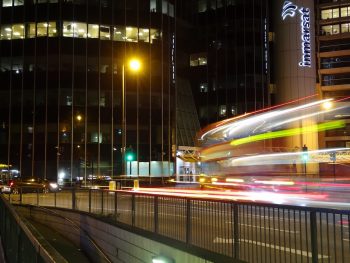New report examines issues around future road user charging scheme in London
A new report exploring the practical issues around a future road user charging scheme in the UK capital is now out from the London Assembly Transport Committee.

The report presents issues that would need to be considered as part of any future road user charging scheme in the capital
Published following a two-part investigation in the 2022/23 Assembly term, the Future Road User Charging in London report sets out recommended ways for such a scheme to go ahead, should any future mayor or government decide to proceed.
It includes 11 recommendations for a future scheme – including ease of use and calling for all potential revenue generated to be assigned to a programme of early improvements to public transport in London, with a significant proportion delivered ahead of introduction.
The report follows a Committee Call for Evidence that received over 3,300 responses from both individuals and organisations, the highest number of responses to any London Assembly Call for Evidence in the 2022-23 Assembly term. It identified significant concerns about the prospect of any new scheme and that privacy concerns and the provision of alternative transport to driving should be key considerations.
The report comes just days after the London Assembly passed a motion opposing a London-wide, pay-per-mile road user charging scheme and urged the Mayor to call Transport for London (TfL) to stop spending money on the preparation for introducing pay per mile road user charging.
While a report commissioned by the Mayor in January 2022 said London would need a new kind of road user charging system implemented by the end of the decade latest – replacing the existing Congestion Charge and ULEZ – Khan in autumn 2023 that he had ditched the plans due to the expansion of the ULEZ to the Greater London boundary.
However, The Telegraph said last month that Sadiq Khan was “investing £150m on a ‘secret’ technology project, replacing outdated ULEZ and Congestion Charge ANPR technology for now but capable of charging motorists a pay-per-mile road tax in the longer term.
The London Assembly Transport Committee investigation focused on examining the practical issues around the potential introduction of a future new, smarter road user charging scheme in London. It did not seek to find consensus between the cross-party members of the Committee on whether or not a new road user charging scheme should be introduced in London, or what any scheme might look like.
Other recommendations in the report include for an open, early, wide and well-publicised public engagement exercise, allowing people to give their views on next steps and shape any scheme design from the very start
Siân Berry, chair of the London Assembly Transport Committee throughout the investigation, said: “This report does not seek to find cross-party consensus on whether or not a smarter road user charging scheme should be introduced in London, or what any scheme might look like.
“Instead, our Committee aimed to explore and present the issues that would need to be considered as part of the development of any future scheme alongside recommendations to any future Mayor or government that was to consider introducing a new scheme.
“The huge reaction we received to our Call for Evidence – over 3,300 responses received – highlights the interest Londoners have in this topic, and the committee is grateful for all of the feedback given.”
She continued: “There is much that any future mayor or government can learn from our recommendations if they were to consider one day exploring this idea.”
The Campaign for Better Transport charity has responded to the report findings.
Silviya Barrett of Campaign for Better Transport said: “A pay-per-mile scheme will not happen soon, but it should be considered for the future as a simpler, fairer alternative to the assortment of charges already in place, especially as charging for the Silvertown and Blackwall tunnels will soon make the picture even more complicated. Simply charging people for the distance they drive could be a much fairer system.
“While plans are being considered, investment in public transport is vital, giving Londoners more choice in how they travel, wherever they are in the capital.”
To access the London Assembly Transport Committee report, click here.
Most drivers against pay-per-mile car tax, Go.Compare study finds
More than half (53%) of UK drivers do not want to see a pay-per-mile system for car tax introduced nationally, according to new research.
A poll by Go.Compare found that only a quarter (26%) of drivers are in favour of switching to pay-per-mile, while one-fifth remain uncertain.
Over half (53%) of drivers against the proposal say it would be used to increase tax, suggesting a lack of confidence that it would be implemented fairly.
Motorists also think it would be unfair on those who have to drive more (52%), would make road tax too complicated (51%), and could not be enforced efficiently (43%).
Three in 10 drivers who oppose the method said they have concerns over how it would be monitored. Potential options for tracking drivers’ miles include a GPS ‘black box’ system, automatic number plate recognition cameras, or manual mileage submission. And for 30% of motorists, the issue of data privacy is enough to deter them.
However, older motorists are more supportive of the switch. One-third of drivers aged 55 and over would like to see a pay-per-mile system, compared to 24% of motorists aged between 35 and 54, and 19% of 18 to 34-year-old drivers. Those in the eldest age group were slightly more certain of their view, too, with only 19% not sure, compared to 21% of drivers of other ages.












